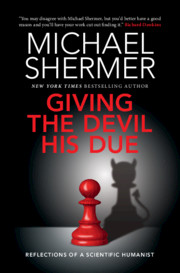Book contents
- Giving the Devil His Due
- Giving the Devil His Due
- Copyright page
- Dedication
- Contents
- Acknowledgments
- Introduction Who Is the Devil and What Is He Due?
- Part I The Advocatus Diaboli: Reflections on Free Thought and Free Speech
- Part II Homo Religiosus: Reflections on God and Religion
- Part III Deferred Dreams: Reflections on Politics and Society
- Part IV Scientia Humanitatis: Reflections on Scientific Humanism
- Chapter 19 Scientific Naturalism
- Chapter 20 Mr. Hume: Tear. Down. This. Wall.
- Chapter 21 Kardashev’s Types and Sparks’ Law
- Chapter 22 How Lives Turn Out
- Part V Transcendent Thinkers: Reflections on Controversial Intellectuals
- Notes
- Index
Chapter 21 - Kardashev’s Types and Sparks’ Law
How to Build Civilization 1.0
from Part IV - Scientia Humanitatis: Reflections on Scientific Humanism
Published online by Cambridge University Press: 28 February 2020
- Giving the Devil His Due
- Giving the Devil His Due
- Copyright page
- Dedication
- Contents
- Acknowledgments
- Introduction Who Is the Devil and What Is He Due?
- Part I The Advocatus Diaboli: Reflections on Free Thought and Free Speech
- Part II Homo Religiosus: Reflections on God and Religion
- Part III Deferred Dreams: Reflections on Politics and Society
- Part IV Scientia Humanitatis: Reflections on Scientific Humanism
- Chapter 19 Scientific Naturalism
- Chapter 20 Mr. Hume: Tear. Down. This. Wall.
- Chapter 21 Kardashev’s Types and Sparks’ Law
- Chapter 22 How Lives Turn Out
- Part V Transcendent Thinkers: Reflections on Controversial Intellectuals
- Notes
- Index
Summary
A shorter version of this essay was originally published in the Los Angeles Times opinion editorial pages on July 22, 2008, as “Toward a Type 1 Civilization: Along with energy policy, political and economic systems must also evolve.” This essay is about how we can transition from a zero-sum tribal world to a nonzero global world.
- Type
- Chapter
- Information
- Giving the Devil his DueReflections of a Scientific Humanist, pp. 243 - 253Publisher: Cambridge University PressPrint publication year: 2020

